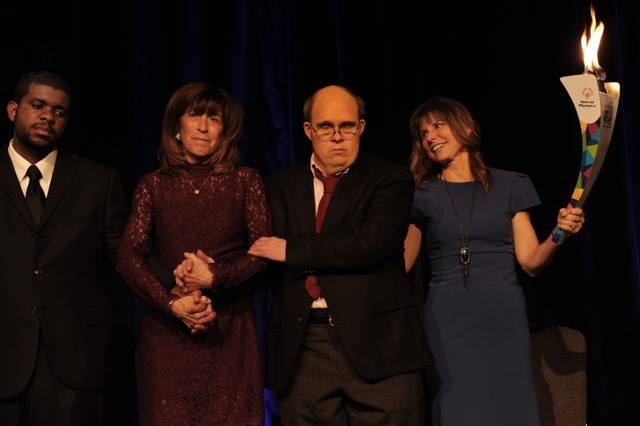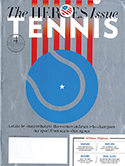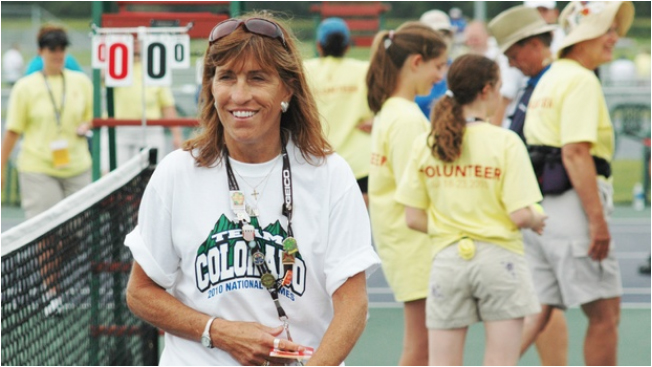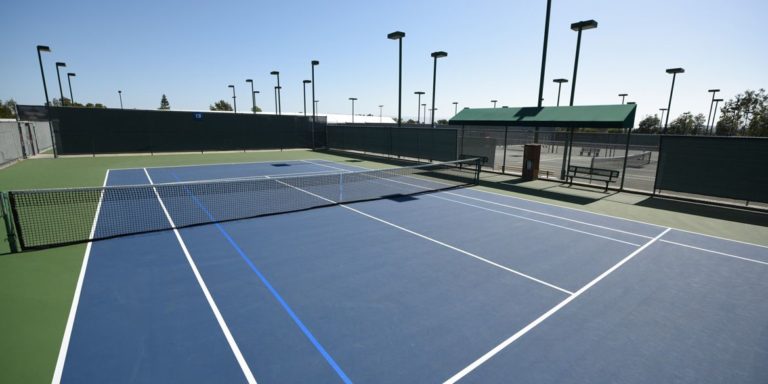Vicky Matarazzo, a Colorado legend
A true tennis angel has returned to the heavens.
It is with great sadness that USTA Colorado shares the news that Colorado’s long-time Special Olympics tennis director, Vicky Matarazzo, has passed away.
Vicky’s legacy of helping people will live on long past her death.
“She is a saint,” says Fritz Garger, Executive Director of USTA Colorado. “Words cannot describe the impact she had on so many people — all of us and so many who were truly in need of love and attention. She provided all that and more! This world will miss her greatly. Vicky did many things beyond our sport to impact people everywhere – but much of what she did was through tennis, illustrating what this sport (and the people who are a part of it) can do for others.”
A recipient of USTA Colorado’s Arthur Ashe Award and USTA Intermountain’s Humanitarian Award, she was also honored by the PTR with its 2009 Humanitarian Award, and again at the 2017 USTA Colorado Hall of Fame Gala.

Vicky Matarazzo is flanked by former students as USTA Colorado presents her with an Olympic torch, commemorating the 2015 Special Olympics World Summer Games.
Vicky has worked with many young athletes through Special Olympics. Back in 2008, the fall issue of Colorado Tennis newspaper featured several of them in a cover story exploring how learning to play tennis with Vicky changed their lives. In 2010, she was asked about her involvement in Special Olympics…
One year ago, Vicky was profiled in TENNIS.com for her work on behalf of the Special Olympics.

SPECIAL OLYMPICS COACH VICKY MATARAZZO CONTINUES TO TOUCH LIVES
by: BLAIR HENLEY | December 03, 2016
When Vicky Matarazzo was diagnosed with breast cancer in 2010, she had simple instructions for her doctors: They needed to perform the necessary mastectomy quickly so she could take her Special Olympics tennis players to nationals five weeks later.
Her medical team obliged, and Matarazzo took her place by her students’ side as she had so many times before. Her dedication to her athletes has become legendary in Colorado since she took over a Denver Special Olympics tennis program 1994. She has expanded opportunities for adaptive athletes exponentially, starting a variety of new programs and watching her players collect medals all over the world.
Matarazzo was a 30-year-old mother of five when she first stepped onto a tennis court. She made a foray into coaching about a decade later, turning a local high school team into a Colorado powerhouse. During that time, she found her true passion after answering an ad for a local Special Olympics coach. “It was like the reason God sent me to tennis at age 30 was not because I was going to go to Wimbledon,” she says, “but because I was going to be a Special Olympics director.”
No disability was too severe for Matarazzo to take on. She has been known to put bells on racquets to help blind athletes, even developing a Velcro fastening system for students unable to properly grip a frame. David Jensen is one of her most memorable success stories. He arrived at a class after a childhood seizure robbed him of his mobility, speech and much of his sight. He now has several gold medals to his name.
“Those born with adversity often turn out better than those of us that weren’t,” Matarazzo says. “Every day of their life is adversity, and we whine about the silliest little things.”
Watching her students deal with disability has undoubtedly prepared Matarazzo to manage her own ongoing health issues. In 2014, just four years after her breast cancer battle, doctors diagnosed her with stage IV lung cancer. Against the odds, the 68-year-old is still active in coaching her beloved Special Olympics players.
“Even though I know my life is probably coming close to an end, I know I’ve had an opportunity to touch lives,” she says. “People think tennis is just a game, but if they spent one day with me, they would see that it is so much more.”
Matarazzo, a recipient of the 2003 Arthur Ashe Humanitarian Award for the USTA Intermountain Section as well as several other local honors, has spoken to many groups in hopes that her experience will inspire others to make a difference. Her enthusiasm is convincing, contagious and immediately invites the question: What are the rest of you waiting for?
“I don’t care if people remember my name, but if they can take one thing away, I’d want them to find an opportunity to change a life.”





